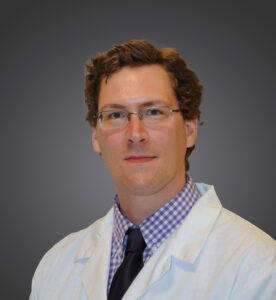Associate Professor

Biography
Aaron LeBeau, PhD is an Associate Professor in the Departments of Radiology and Pathology and Laboratory Medicine. The LeBeau laboratory operates at the interface of synthetic biology and nuclear medicine with the goal is to develop novel antibody-based molecular imaging probes and targeted therapeutics for cancer. The laboratory specializes in antibody phage display, which allows the team to rapidly identify antibody fragments against cancer-associated antigens using the in-house human and mouse antibody libraries. When coupled to radioisotopes, antibodies are employed as positron-emission tomography (PET) and single-emission computed tomography (SPECT) nuclear imaging probes and as radioimmunotherapy agents. The laboratory has also developed non-human single-domain antibody libraries from naïve camelids and nurse sharks that will serve as next-generation antibody-drug conjugates and imaging probes in oncology. In addition to the work in cancer, the LeBeau laboratory has active projects developing non-canonical neutralizing antibodies and imaging probes for beta-coronaviruses including SARS-CoV-2.
A native of Illinois, Dr. LeBeau was a double major at the University of Arizona receiving B.S. degrees in Molecular and Cellular Biology and Chemistry with a minor in Classical Art and Archaeology. He then received his Ph.D. in Pharmacology from the Johns Hopkins University School of Medicine where he developed small-molecule-based therapeutics for prostate cancer under the guidance of Samuel Denmeade, MD. After graduate school, he was a Department of Defense Postdoctoral Fellow at the University of California San Francisco in the Department of Radiology where he studied antibody engineering and preclinical nuclear imaging. His laboratory relocated to the UW-Madison in June 2021 after seven years at the University of Minnesota Medical School. Aaron has received many awards for his research, including from the Society of Nuclear Medicine and the Prostate Cancer Foundation.
Education
- Undergraduate University of Arizona (Tuscon, AZ)
- Graduate Johns Hopkins University (Baltimore, MD)
- PostDoc University of California (San Francisco, CA)